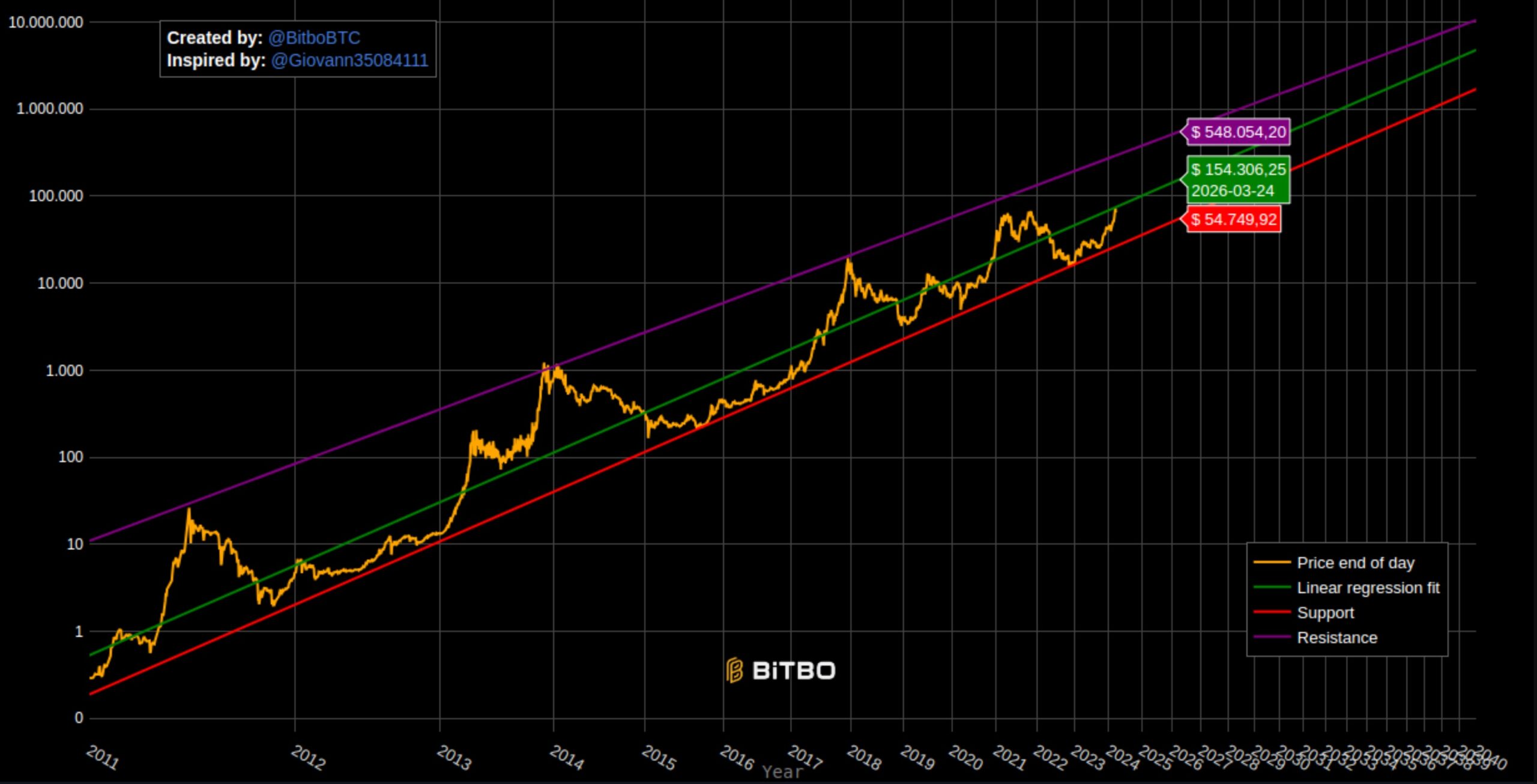In the realm of Bitcoin price prediction, the “Power Law” model emerges as a compelling candidate, garnering significant attention for its potential to accurately reflect the trajectory of Bitcoin’s value. But does this universal law truly apply to Bitcoin, and what implications does it hold for the future of this digital currency? Could we witness seven-figure Bitcoin valuations in the 2030s? Delving into the intricacies of this model unveils a fascinating perspective on the dynamics of Bitcoin pricing and its future trajectory.
Unveiling the Power Law: A Universal Phenomenon
At its core, the Power Law model encapsulates a class of formulas that intricately describe curves, employing three fundamental parameters: a, x, and b. These formulas, represented as a * x^b, elucidate how a particular value, y, changes in relation to the variable, x, raised to the power of b. This universal law finds manifestation across diverse domains, from geometric principles governing land area expansion to the gravitational pull in physics, and even societal phenomena such as population growth and economic disparities. Essentially, the Power Law emerges as a fundamental framework governing iterative processes and self-reinforcing systems, permeating through the fabric of nature and human interactions.
Deciphering Bitcoin’s Feedback Loop
In the realm of Bitcoin, understanding the intricacies of the Power Law entails unraveling the feedback loop between price dynamics, miners, and users. A model devised by Giovanni Santostasi delineates this intricate interplay, portraying Bitcoin’s evolution as a cascade of interactions amplifying its value proposition. As more users adopt Bitcoin, its value surges, driving increased mining activities and augmenting network security. This symbiotic relationship forms the cornerstone of Santostasi’s model, where the growth of users is endowed with exponential power, shaping the trajectory of Bitcoin adoption:
- Addresses = t^3
- Price = Addresses^2 = (t^3)^2 = t^6
- Hash Rate = Price^2 = (t^6)^2 = t^12
Based on this framework, Santostasi and collaborators devised a series of curves culminating in a primary equation:
P = $38,788 * (B/15)^5.41
This equation delineates Bitcoin’s price growth, intricately tied to block time fluctuations, with remarkable accuracy spanning over 13 years.
Navigating Bitcoin’s Price Trajectory: Insights from the Power Law
The concept of a “fair price” emerges as a focal point in Santostasi’s analysis, providing insights into Bitcoin’s valuation vis-a-vis the Power Law model. According to this paradigm, the “fair price” stands at $62,835, indicating a slight overvaluation of Bitcoin at present. However, the model’s efficacy lies in its ability to capture Bitcoin’s fluctuating dynamics, punctuated by periods of bubbles and corrections. While the Power Law offers a robust framework for understanding Bitcoin’s price evolution, its applicability hinges on interpreting fluctuations within the broader context of market dynamics.

Probing into the Future: Forecasts and Speculations
Peering into the future through the lens of the Power Law unveils a spectrum of potential trajectories for Bitcoin’s price. By extrapolating future scenarios, analysts speculate on the evolution of Bitcoin’s valuation over time:
- September 21st: Forecasts indicate a minimum price of $32,000, with a maximum nearing $350,000 and a “fair” price hovering around $90,000.
- March 13, 2025: Projections suggest a lower limit of $38,000, with a maximum surpassing $400,000, and a “fair price” nearing $110,000.
- March 24, 2026: Anticipated price ranges oscillate between almost $55,000 and $550,000, with a median price reaching $150,000.
- March 2028: Price projections span from $100,000 to $950,000, signaling a trajectory towards exponential growth.
- 2033 and Beyond: As Bitcoin’s adoption curve matures, forecasts hint at a fair price surpassing $1.3 million by the end of 2033, with projections soaring to almost $5 million by the dawn of 2040.
While these projections paint a tantalizing picture of Bitcoin’s future trajectory, it’s imperative to acknowledge the inherent limitations of any predictive model. The journey towards widespread adoption and market maturity unfolds amidst a complex interplay of technological advancements, regulatory developments, and investor sentiment, introducing variables that defy deterministic forecasting.
Unraveling the Enigma: The Quest for Sustainable Growth
As Bitcoin’s price trajectory unfolds, the concept of the S-curve emerges as a poignant reminder of the inherent ebb and flow in technological adoption. While the Power Law illuminates Bitcoin’s exponential growth phase, characterized by a factor of 3, it also foreshadows an eventual transition towards a more linear growth trajectory. Analogous to the diffusion of innovations, Bitcoin’s evolution may mirror the typical lifecycle of transformative technologies, marked by phases of rapid expansion followed by stabilization.
Embracing Uncertainty: Navigating the Future of Bitcoin
In navigating the enigmatic terrain of Bitcoin price prediction, embracing uncertainty emerges as a prudent approach. While the Power Law offers invaluable insights into Bitcoin’s evolutionary dynamics, its predictive efficacy wanes amidst the myriad complexities shaping the digital currency landscape. As Bitcoin continues to chart its course amidst a sea of volatility and innovation, the journey towards sustainable growth and widespread adoption unfolds as a testament to the resilience of decentralized finance.
In essence, while the Power Law offers a compelling framework for understanding Bitcoin’s price dynamics, its true potential lies in fostering a nuanced discourse around the future trajectory of this transformative technology. As we embark on this journey of exploration and discovery, let us embrace the uncertainty inherent in Bitcoin’s evolution, navigating the intricate interplay of market forces and technological innovation with steadfast resolve and unwavering curiosity.



